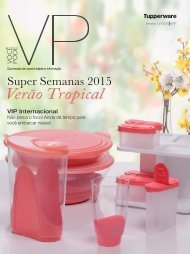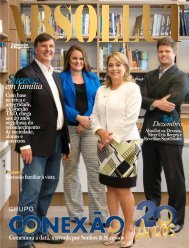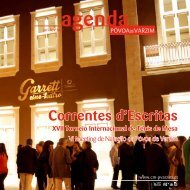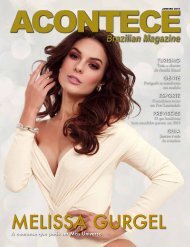Focus
Terri Profett o, Mai Yomioto, Ginny Grimsley, Allison Stephens, Michelle Tomao,Fernanda Calfat, Arun Nevader, Neilson Barnard, Albert Urso, Scott Black, LauraFerreira, Antonio Martez, Scott Black, Dan Myricks, Krystina Woldanowski,Samantha Ramos, Frazer Harrison, Alexandra Cook, Melissa DeHaven, SusanBennett , Diane VanArsdale, Richard Evans, Jim France, Richard RamosFocus Magazine of SWFL is published Bimonthly. Articles do notnecessarily reflect Focus Magazine of SWFL policy. © 2010 FocusMagazine of SWFL, All rights reserved. Reproduction in part orwhole without permission is prohibited. Postmaster: Send allremittances and correspondences about subscriptions, undeliveredcopies and address changes to: Focus Magazine of SWFL at105 Triple Diamond Blvd, Suite 101, Venice, FL 34275. Editorial,publishing and advertising offices.
Terri Profett o, Mai Yomioto, Ginny Grimsley, Allison Stephens, Michelle Tomao,Fernanda Calfat, Arun Nevader, Neilson Barnard, Albert Urso, Scott Black, LauraFerreira, Antonio Martez, Scott Black, Dan Myricks, Krystina Woldanowski,Samantha Ramos, Frazer Harrison, Alexandra Cook, Melissa DeHaven, SusanBennett , Diane VanArsdale, Richard Evans, Jim France, Richard RamosFocus Magazine of SWFL is published Bimonthly. Articles do notnecessarily reflect Focus Magazine of SWFL policy. © 2010 FocusMagazine of SWFL, All rights reserved. Reproduction in part orwhole without permission is prohibited. Postmaster: Send allremittances and correspondences about subscriptions, undeliveredcopies and address changes to: Focus Magazine of SWFL at105 Triple Diamond Blvd, Suite 101, Venice, FL 34275. Editorial,publishing and advertising offices.
Create successful ePaper yourself
Turn your PDF publications into a flip-book with our unique Google optimized e-Paper software.
Your<br />
Financial Future in 2014<br />
Photo by Smith John<br />
Financial resolutions can be the most difficult to keep. They<br />
can include minute detail, number crunching, plenty of files<br />
and discipline that can affect a person’s entire lifestyle, says<br />
veteran investment advisor Paul Taylor, a member of the National<br />
Ethics Bureau.<br />
“Many folks simply are not predisposed to combing through the<br />
details of their financial situation; for them, the financial world<br />
is abstract and filled with arbitrary rules, constantly changing<br />
interest rates and other complexities, but being more involved<br />
in your own money is well worth the investment,” says Taylor,<br />
an architect-turned-founder and owner of Capital Advisory<br />
Group & Tax Planners of Lake Norman and Capital Investment<br />
Advisors, Inc.<br />
“While professional help is recommended for many aspects of<br />
a person’s financial affairs, it’s ultimately up to the individual<br />
to understand his or her own money.”<br />
There are many things the average person can do to take<br />
control of their financial life. Taylor offers the following suggestions:<br />
• For your cash flow, keep in mind the four A’s: Accounting,<br />
Analysis, Allocation and Adjustment. The four A’s describe<br />
a systematic and disciplined approach to your daily, weekly,<br />
monthly and yearly spending habits. Accounting involves gathering<br />
all your relevant financial information – income, recurring<br />
bills, and other expenditures – creating a central list of<br />
each item, and pulling it together in a place where it’s easily<br />
accessible. Analysis is reviewing the information to determine<br />
whether you have a shortfall or surplus, and finding places<br />
to reduce expenses. Saving $100 a month on dining out, for<br />
instance, would allow you to apply $100 to your mortgage<br />
loan principle, saving you a substantial amount in interest<br />
payments. Allocation involves determining your financial commitments<br />
and priorities, needs versus wants, and distributing<br />
your income accordingly. Adjustment involves periodic reviews<br />
of your financial information and shifting assets to meet<br />
changing needs.<br />
50 FOCUS of SWFL 2014<br />
www.capitaladvgroup.com<br />
By Ginny Grimsley<br />
• Utilize estate planning tools such as wills and trusts; make<br />
sure the details are accurate. Wills and trusts allow you to<br />
spell out how you would like your property to be distributed,<br />
and much more. A will gives you the opportunity to nominate<br />
your executor and guardians for your minor children. If you<br />
fail to make such designations through your will, the decisions<br />
will probably be left to the courts. Bear in mind that property<br />
distributed through your will is subject to probate, which can<br />
be a time-consuming and costly process. Trusts, which are<br />
more complex, let you customize the distribution of your estate<br />
with the added advantages of property management and<br />
probate avoidance.<br />
• Start planning your retirement sooner rather than later.<br />
There are a variety of retirement planning options that can<br />
meet your needs. Your employer funds some; you fund some.<br />
Bear in mind that, in most cases, early withdrawals before age<br />
59½ may be subject to a 10 percent federal income tax penalty.<br />
The latest date to begin required minimum distributions is<br />
usually April 1 of the year after you turn age 70½. Withdrawals<br />
from tax-deferred plans are taxed as ordinary income. The<br />
top planning options include defined benefit pension; money<br />
purchase pension; profit-sharing plan; savings plan; employee<br />
stock ownership plan; tax-sheltered annuities; individual retirement<br />
accounts; self-employed plans; simplified employee<br />
pensions; and savings incentive match plans for employees.<br />
• Remember the first commandment in safe investment: diversification.<br />
Virtually every investment has some type of risk<br />
associated with it. Don’t put all your eggs in one basket. Diversification<br />
is one of the main reasons why mutual funds may be<br />
so attractive for both experienced and novice investors. Many<br />
non-institutional investors have a limited investment budget<br />
and may find it challenging to construct a portfolio that is<br />
sufficiently diversified. For a modest initial investment, you<br />
can purchase shares in a diversified portfolio of securities. Depending<br />
on the objectives of the fund, it may contain a variety<br />
of stocks, bonds and cash vehicles, or a combination of them.

















